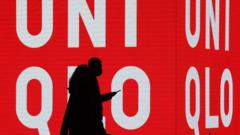Uniqlo's CEO Tadashi Yanai has come under fire in China following comments made during a BBC interview regarding the company's avoidance of Xinjiang cotton. This has led to calls for a boycott on social media, as tensions rise over the allegations of forced labor linked to the region's cotton production.
Uniqlo's CEO Sparks Outrage in China Over Xinjiang Cotton Remarks

Uniqlo's CEO Sparks Outrage in China Over Xinjiang Cotton Remarks
The Japanese clothing retailer Uniqlo faces significant backlash in China after its CEO, Tadashi Yanai, revealed the company's non-sourcing of cotton from Xinjiang, a move considered controversial amid allegations of forced labor in the region.
Uniqlo is experiencing a backlash in China after its parent company’s CEO, Tadashi Yanai, stated in a recent BBC interview that the Japanese retailer does not source cotton from Xinjiang. This statement has ignited a wave of controversy online, with many Chinese commentators urging a boycott of the brand. The Xinjiang region is at the center of international scrutiny due to accusations from various organizations, including the US government, alleging the use of forced labor among the Muslim Uyghur minority in cotton production—a claim that Beijing has steadfastly denied.
After Yanai’s comments aired, users flocked to social media platform Weibo, creating trending hashtags such as "Controversy over Uniqlo founder’s remarks," "Xinjiang cotton is the best in the world," and "I support Xinjiang cotton." Some users criticized Uniqlo's stance, suggesting that the company's leadership was overconfident in believing consumers would forget the incident quickly.
Yanai's public statement, "We’re not using [cotton from Xinjiang]," was met with backlash as he hesitated to elaborate further, saying it could become too political if he did. This reluctance to engage deeper with the political implications of sourcing policies has drawn scrutiny, particularly considering China's significance to Uniqlo—not only as a substantial market but also as a vital manufacturing location.
The political landscape surrounding Xinjiang cotton has seen major repercussions for other global brands. For example, Swedish retailer H&M faced significant fallout after refusing to source cotton from the area, leading to the removal of its products from numerous e-commerce platforms in China. Similarly, brands like Nike, Burberry, and Adidas have also faced boycotts for their positions on the issue.
In contrast to other Western firms, Uniqlo had previously managed to navigate these turbulent waters, primarily due to Yanai's avoidance of a definitive stance amid ongoing debates. However, recent developments, including an investigation launched by China's commerce ministry into the parent company of Calvin Klein and Tommy Hilfiger for allegedly "unjustly boycotting" Xinjiang cotton, indicate that tensions will likely continue to escalate.
As the backlash unfolds, it remains to be seen how Uniqlo will address the growing public dissatisfaction and its implications for its operations in China moving forward.

















